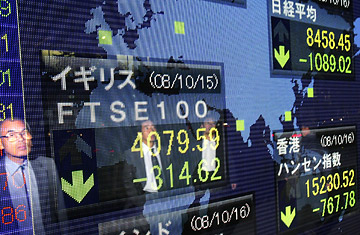
Passersby look at a Tokyo securities firm's electronic board indicating the global stock downturn
It was nice while it lasted. But now down we go again.
Following their short-lived surge earlier this week, world stock markets on Thursday took a seriously bearish stance, drawing markets that had already slumped Wednesday further down. Tokyo's Nikkei lost more than 11% — virtually wiping out its stunning spurt earlier in the week — and bourses elsewhere in Asia and across Europe experienced steep falls. What is inspiring traders to dump stocks in droves is a darkening economic outlook that continues to destabilize markets.
Though it doesn't change the dismal bottom line, there is a difference between the current slide and the one that eviscerated markets last week. The earlier rout was caused by continuing fears that governments were not sufficiently committed to prevent the world's finance and banking sector from collapsing — worries temporarily allayed by rescue plans announced over the weekend in Washington and Paris, and detailed in trillion-dollar-terms Monday. But the confidence those measures inspired in global markets has given way to more classic concerns among traders of a looming economic downturn — or quite probably recession — undermining the business activity and results of traded companies. That souring of spirits was evidenced Wednesday with indices sliding across Asia and Europe, and Wall Street following suit with a 7.9% dip.
Thursday brought dreaded confirmation that markets look set to remain in tank mode until they find reason for taking heart anew. In addition to the 11.4% slump of Nikkei — its biggest single-day drop since the October, 1987 crash — trading Thursday elsewhere in Asia pushed Hong Kong's Hang Seng down 4.8%, South Korea's down 9.44%, and Singapore Straights Times Index down 5.5%. Europe faired no better, with London's FTSE 100 and Paris' CAC 40 indices reflecting mid-morning declines of nearing 2.5%, and Frankfurt's Dax off 1.3%. Market commentators warned that trading could see-saw throughout the day, but expected European bourses to close down and Wall Street to open moving in the same direction.
Those declines followed a trickle of new data suggesting a slowing of U.S. economic activity, and follow-through damage inflicted by the global financial crisis. Statistics released Wednesday showed American retail sales were off 1.2% in September — almost double the expected decline. That added weight to other indicators suggesting U.S. consumer spending — which represents nearly 70% of American economic activity — is declining due to fears over economic turmoil and job security.
That, of course, is bad news for the U.S., but it also means the one-two punch of the financial crisis and possible recession could mete out pain around the globe. "Stabilization of the financial markets is a critical first step," said U.S. Fed Chairman Ben Bernanke Wednesday. "But even if they stabilize as we hope they will, broader economic recovery will not happen right away."
That isn't what markets vulnerable to American troubles want to hear, particularly the export-dependent economies of Asia, where concerns about a possible recession are compounded by doubts that the evolving, $2.2 trillion U.S. plan to bail out its finance and banking system will prove effective. For those reasons, some see flightiness reigning in stock markets for the foreseeable future. "I expect volatility to continue for some time as long as confidence hasn't been restored," says Matthew Kwok, head of research at Hong Kong's Tanrich Securities. "Sentiments are quite pessimistic."
Such doubt is starting to hack off some leaders in Europe, who are getting impatient with market still fearful despite the $2 trillion plan announced by the 15 eurozone countries to buck up banks and credit systems. "We should stop looking at stock market activity the way a mouse watches a cat, and start thinking in the medium-term," the Luxembourg Prime Minister Jean-Paul Juncker told German radio Deutschlandfunk. Belying his own maxim, however, Juncker suggested additional efforts European governments may be planning to make should "impress the financial markets."
Yet traders will likely remain tough to wow. According to a draft that Reuters obtained of a final statement written for Thursday's conclusion of the summit of European Union leaders in Brussels, resolutions have largely been limited to approving the rescue plan and coordinated strategies of eurozone nations, along with vague promises of help when the crisis-aggravated recession sets in.
"Outside the financial sector," Reuters quotes the draft, "the European Council underlines its determination to take the necessary steps to react to the slowdown in demand and the contraction in investment and in particular to support European industry." There's every indication that that help will be sorely needed.
— With reporting by Peter Ritter / Hong Kong
